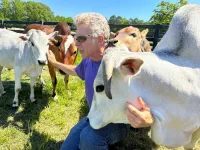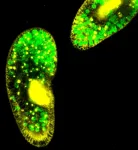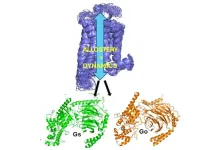(Press-News.org) During the height of the COVID-19 pandemic Gregory Berns, a neuroscientist at Emory University, moved from Atlanta to a farm an hour south of the city. His reinvention from city dweller to farmer led to his upcoming book “Cowpuppy: An Unexpected friendship and a Scientist’s Journey into the Secret World of Cows.”
Set for publication by Harper Collins on August 20, the book describes Berns’ crash course to becoming a cattleman and his ongoing fascination with the interior world of cows.
Berns originally bought a few cows to keep the grass in the pastures down. He writes about how he forged a deep bond with his herd as he learned each of their distinct personalities while helping them to give birth, to grow and to stay healthy. He senses a wide range of human emotions in them and finds their presence therapeutic.
“I started seeing the world through a cow’s eyes,” he says. “There’s a common misconception that cows are dumb animals but that’s just because most people haven’t had the opportunity to interact with them. I decided it was time to set the record straight on cow brains.”
Berns, an Emory professor of psychology, pioneered the use of brain imaging technologies to understand human motivation and decision-making. In 2012, his lab was the first to train dogs to enter a functional magnetic resonance imaging machine to lie awake and perfectly still while their brain activity was recorded.
This unique approach to explore canine cognition led Berns to become a bestselling author with the publication of “How Dogs Love Us” in 2013. It is just one of many popular books by Berns, including, in 2022, “The Self Delusion: The New Neuroscience of How We Invent — and Reinvent — Our Identities.”
“Cowpuppy” marks a new chapter in Berns’ quest to understand interspecies bonding.
His 10 miniature Zebu cattle gather around him like affectionate dogs when he enters the pasture. They even lie down and roll over so he can give them belly rubs. In return, they nuzzle him and give him cow licks.
“Cows are intelligent, emotional and loyally affectionate,” Berns says. “I’ve seen them do things that I haven’t even seen dogs do — like understanding how to use a giant mirror I erected in the pasture.”
His cows have become part of his family and will never wind up as hamburgers or steaks. Instead, Berns describes how cows teach people to slow down and connect to the environment.
He writes about leaning against the hulk of a cow chewing its cud in the evenings while he marvels at the stars: “Whenever I felt the weight of life’s challenges, I sought out the cows. I often found myself drifting off into a meditative state after these sessions. I felt relaxed in a way that I hadn’t before.”
END
'Cowpuppy' takes readers into secret world of cows
Caring for cattle expands the mind of a neuroscientist
2024-08-01
ELSE PRESS RELEASES FROM THIS DATE:
Warming stops tiny organisms working together
2024-08-01
Hotter conditions prevent two tiny organisms working together for mutual benefit, new research shows.
University of Exeter scientists studied a single-celled organism (Paramecium bursaria) which can absorb and host algae (Chlorella spp).
This pairing is common in freshwater worldwide, and their symbiotic relationship provides benefits including trading of nutrients and protection for the algae.
But when scientists made the water 5°C warmer, the partnership stopped working – and the results suggest the algae may even become parasitic.
The breakdown of such relationships could have a major impact on ecosystems.
“This ...
Gun permits may be more effective than background checks alone at reducing firearm homicides
2024-08-01
Despite widespread support, laws enforcing universal background checks at the time of firearm purchase may not be enough to move the needle on reducing shooting deaths in the United States. A Tufts University School of Medicine study, published August 1 in the journal JAMA Network Open, reports that states that require gun permits rather than relying solely on universal background checks see firearm homicide rates, on average, 18% lower than states with background check policies alone.
The analysis compared firearm homicide data from the 12 states with universal background check laws but no permit ...
Study finds regular aspirin use associated with greatest reduction in colorectal cancer among those most at risk
2024-08-01
Regular aspirin may help lower risk of colorectal cancer in people with greater lifestyle-related risk factors for the disease, according to a study led by researchers at Mass General Brigham. The study, published in JAMA Oncology, could encourage a more nuanced approach to preventive aspirin use.
“We sought to identify individuals who are more likely to benefit from aspirin to facilitate more personalized prevention strategies,” said co-senior author Andrew Chan, MD, MPH, Director of Epidemiology for the Mass General Cancer Center and gastroenterology Director of the Center for ...
Diagnostic accuracy of an integrated AI tool to estimate gestational age from blind ultrasound sweeps
2024-08-01
About The Study: Between 14 and 27 weeks’ gestation, novice users with no prior training in ultrasonography estimated gestational age as accurately with the low-cost, point-of-care artificial intelligence (AI) tool as credentialed sonographers performing standard biometry on high-specification machines. These findings have immediate implications for obstetrical care in low-resource settings, advancing the World Health Organization goal of ultrasonography estimation of gestational age for all pregnant people.
Quote from corresponding author Jeffrey ...
Aspirin use and incidence of colorectal cancer according to lifestyle risk
2024-08-01
About The Study: Aspirin use was associated with a greater absolute reduction in risk of colorectal cancer among individuals with less healthy lifestyles in this cohort study. The findings of the study suggest that lifestyle risk factors may be useful to identify individuals who may have a more favorable risk-benefit profile for cancer prevention with aspirin.
Corresponding Authors: To contact the corresponding authors, email Andrew T. Chan, MD, MPH (achan@mgh.harvard.edu) and Long H. Nguyen, MD, MS (lnguyen24@mgh.harvard.edu).
To access the embargoed study: Visit our For The Media website at this link https://media.jamanetwork.com/
(doi:10.1001/jamaoncol.2024.2503)
Editor’s ...
State abortion policy and moral distress among clinicians providing abortion after the Dobbs decision
2024-08-01
About The Study: In this purposive national survey study of clinicians providing abortion, moral distress was elevated among all clinicians and more than twice as high among those practicing in states that restrict abortion compared with those in states that protect abortion. The findings suggest that structural changes addressing bans on necessary health care, such as federal protections for abortion, are needed at institutional, state, and federal policy levels to combat widespread moral distress.
Corresponding Author: To contact the corresponding author, ...
Universal background checks, permit requirements, and firearm homicide rates
2024-08-01
About The Study: This cross-sectional study found that universal background checks alone were not associated with firearm homicide rates, but a permit requirement for the purchase and possession of firearms was associated with substantially reduced rates of firearm homicide. The findings suggest that combining universal background checks and permit-to-purchase requirements is an effective strategy for firearm-related fatality reduction.
Corresponding Author: To contact the corresponding author, Michael Siegel, MD, MPH, email mike.siegel@tufts.edu.
To access the embargoed study: Visit our For The Media website at this link https://media.jamanetwork.com/
(doi:10.1001/jamanetworkopen.2024.25025)
Editor’s ...
Joseph Rogers, MD, named to American Board of Internal Medicine’s Cardiovascular Board
2024-08-01
Houston, Texas, July 24, 2024 – The Texas Heart Institute, a globally renowned cardiovascular health center, announced today that Joseph G. Rogers, MD, President and Chief Executive Officer for The Texas Heart Institute and Adjunct Professor in the Division of Cardiology at Duke University, has been appointed by the American Board of Internal Medicine (ABIM) to its Cardiovascular Board for a three-year term beginning July 1, 2024.
“I am honored to have been appointed to this esteemed group ...
Study examines effect of fish oil in older adults’ brains
2024-08-01
A clinical trial at Oregon Health & Science University suggests that a subset of older adults with a genetic predisposition to Alzheimer’s disease may benefit from fish oil supplements.
The study published today in the journal JAMA Network Open.
The results come amid claims that fish oil supplements can improve brain function in people with memory problems. The study found no statistically significant benefit for all older adults in general. However, among those enrolled in the study who also carry a gene associated with Alzheimer’s disease, it showed a reduction in the breakdown of nerve cells in the brain.
The study’s senior co-author from OHSU ...
Conformational dynamics and allostery elucidate how GPCR couple to multiple G-proteins, offering mechanistic insights into coupling-promiscuity and novel drug discovery strategies
2024-08-01
In a groundbreaking study, a multinational research team led by Dr. Adnan Sljoka (RIKEN) and Prof. Akio Kitao (Tokyo Tech), in collaboration with Prof. Scott Prosser (University of Toronto), has carried out experimental and computational studies to elucidate the mechanisms behind G protein selectivity and efficacy in the human adenosine A2A receptor (A2AR). A2AR is a member of major drug targets G protein-coupled receptor (GPCR) superfamily, which engages the G protein and initiates cell signaling, influencing heart health, inflammation, cancer, and brain diseases. Scientists have ...
LAST 30 PRESS RELEASES:
Blood test predicts which bladder cancer patients may safely skip surgery
Kennesaw State's Vijay Anand honored as National Academy of Inventors Senior Member
Recovery from whaling reveals the role of age in Humpback reproduction
Can the canny tick help prevent disease like MS and cancer?
Newcomer children show lower rates of emergency department use for non‑urgent conditions, study finds
Cognitive and neuropsychiatric function in former American football players
From trash to climate tech: rubber gloves find new life as carbon capturers materials
A step towards needed treatments for hantaviruses in new molecular map
Boys are more motivated, while girls are more compassionate?
Study identifies opposing roles for IL6 and IL6R in long-term mortality
AI accurately spots medical disorder from privacy-conscious hand images
Transient Pauli blocking for broadband ultrafast optical switching
Political polarization can spur CO2 emissions, stymie climate action
Researchers develop new strategy for improving inverted perovskite solar cells
Yes! The role of YAP and CTGF as potential therapeutic targets for preventing severe liver disease
Pancreatic cancer may begin hiding from the immune system earlier than we thought
Robotic wing inspired by nature delivers leap in underwater stability
A clinical reveals that aniridia causes a progressive loss of corneal sensitivity
Fossil amber reveals the secret lives of Cretaceous ants
Predicting extreme rainfall through novel spatial modeling
The Lancet: First-ever in-utero stem cell therapy for fetal spina bifida repair is safe, study finds
Nanoplastics can interact with Salmonella to affect food safety, study shows
Eric Moore, M.D., elected to Mayo Clinic Board of Trustees
NYU named “research powerhouse” in new analysis
New polymer materials may offer breakthrough solution for hard-to-remove PFAS in water
Biochar can either curb or boost greenhouse gas emissions depending on soil conditions, new study finds
Nanobiochar emerges as a next generation solution for cleaner water, healthier soils, and resilient ecosystems
Study finds more parents saying ‘No’ to vitamin K, putting babies’ brains at risk
Scientists develop new gut health measure that tracks disease
Rice gene discovery could cut fertiliser use while protecting yields
[Press-News.org] 'Cowpuppy' takes readers into secret world of cowsCaring for cattle expands the mind of a neuroscientist





